
Monopoly is a multiplayer economics-themed board game. In the game, players roll two dice to move around the game board, buying and trading properties and developing them with houses and hotels. Players collect rent from their opponents and aim to drive them into bankruptcy. Money can also be gained or lost through Chance and Community Chest cards and tax squares. Players receive a salary every time they pass "Go" and can end up in jail, from which they cannot move until they have met one of three conditions. House rules, hundreds of different editions, many spin-offs, and related media exist.

RuneQuest is a fantasy tabletop role-playing game originally designed by Steve Perrin, Ray Turney, Steve Henderson, and Warren James, and set in Greg Stafford's mythical world of Glorantha. It was first published in 1978 by The Chaosium. Beginning in 1984, publication passed between a number of companies, including Avalon Hill, Mongoose Publishing, and The Design Mechanism, before finally returning to Chaosium in 2016. RuneQuest is notable for its system, designed around percentile dice and an early implementation of skill rules, which became the basis for numerous other games. There have been several editions of the game.

Steve Jackson Games (SJGames) is a game company, founded in 1980 by Steve Jackson, that creates and publishes role-playing, board, and card games, and the gaming magazine Pyramid.
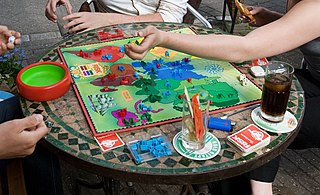
Risk is a strategy board game of diplomacy, conflict and conquest for two to six players. The standard version is played on a board depicting a political map of the world, divided into 42 territories, which are grouped into six continents. Turns rotate among players who control armies of playing pieces with which they attempt to capture territories from other players, with results determined by dice rolls. Players may form and dissolve alliances during the course of the game. The goal of the game is to occupy every territory on the board and, in doing so, eliminate the other players. The game can be lengthy, requiring several hours to multiple days to finish. European versions are structured so that each player has a limited "secret mission" objective that shortens the game.
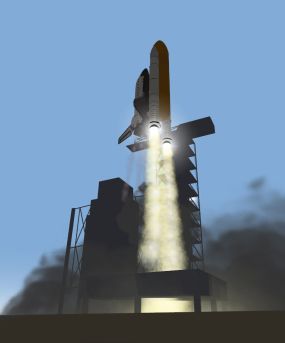
Orbiter is a space flight simulator program developed to simulate spaceflight using realistic Newtonian physics. The simulator was released on 27 November 2000; the latest edition, labeled "Orbiter 2016", was released on 30 August 2016, the first new version of the simulator since 2010. On 27 July 2021, Dr Schweiger announced to the Orbiter Community that Orbiter is being published under open source MIT license.
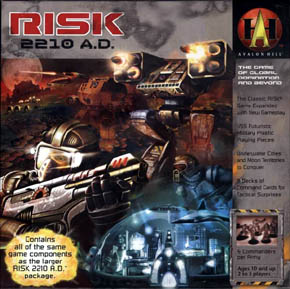
Risk 2210 A.D. is a 2–5 player board game by Avalon Hill that is a futuristic variant of the classic board game Risk. Risk 2210 A.D. was designed by Rob Daviau and Craig Van Ness and first released in 2001. In 2002, it won the Origins Award for "Best Science Fiction or Fantasy Board Game of 2001".

Cosmic Encounter is a science fiction–themed strategy board game designed by "Future Pastimes" and originally published by Eon Games in 1977. In it, each player takes the role of a particular alien species, each with a unique power to bend or break one of the rules of the game, trying to establish control over the universe. The game was inducted into the Academy of Adventure Gaming Arts & Design Adventure Gaming Hall of Fame in 1997.
Monopoly Junior is a simplified version of the board game Monopoly, designed for young children, which was originally released in 1990. It has a rectangular board that is smaller than the standard game and rather than using street names it is based on a city's amusements to make the game more child-friendly. There are many different models of the game.

Space Crusade is an adventure board game produced by Milton Bradley together with Games Workshop and was first made in 1990. It was produced in the UK and available in some other countries including Finland, Ireland, France, Spain, Denmark, Australia, Hellas and New Zealand. In Germany, Italy, Belgium and the Netherlands, it is known as Star Quest.

Zombies!!! is a tile-based strategy board game for two to six players. Zombies!!! won the 2001 Origins Award for Best Graphic Presentation of a Board Game, and Zombies!!! 3: Mall Walkers won 2003's Origins Award for Best Board Game Expansion.

Triplanetary is a science fiction board wargame originally published by Game Designers' Workshop in 1973. The game is a simulation of space ship travel and combat within the Solar System in the early 21st Century.
Landslide is a board game about the U.S. presidential elections published by Parker Brothers in 1971.
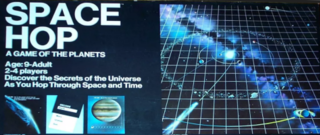
Space Hop is an educational board game about astronomy published by Teaching Concepts in 1973.

Monopoly: The Mega Edition is a special variant of the popular Hasbro board game Monopoly. The game was first published on May 22, 2006 by Winning Moves Games USA in the United States. A UK version was adapted on October 1, 2007.
Killer Bunnies and the Journey to Jupiter is a 2008 board game with a non-collectible card game element created by Jeff Bellinger as a sequel to his game, Killer Bunnies and the Quest for the Magic Carrot, and published by Playroom Entertainment.

RoboRally, also stylized as Robo Rally, is a board game for 2–8 players designed by Richard Garfield and published by Wizards of the Coast (WotC) in 1994. Various expansions and revisions have been published by WotC, Avalon Hill, and Renegade Games.
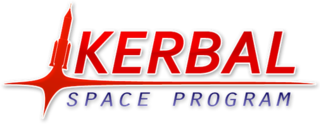
Kerbal Space Program (KSP) is a space flight simulation video game developed by Mexican studio Squad for Linux, macOS, Windows, PlayStation 4, PlayStation 5, Xbox Series X/S and Xbox One. In the game, players direct the space program of a species of green humanoid aliens known as "Kerbals". The game features a pseudorealistic orbital physics engine, allowing for various real-life orbital maneuvers such as Hohmann transfer orbits and orbital rendezvous.
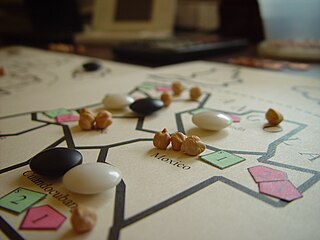
Game design is the process of creating and shaping the mechanics, systems and rules of a game. Games can be created for entertainment, education, exercise or experimental purposes. Additionally, elements and principles of game design can be applied to other interactions, in the form of gamification. Game designer and developer Robert Zubek defines game design by breaking it down into its elements, which he says are the following:

Xenocide is a scrolling shooter for the Apple IIGS written by Pangea Software and published by Micro Revelations in 1989. An IBM PC compatible port using VGA graphics was developed by Manley & Associates and published in 1990. The box cover credits Brian Greenstone as the game's creator on both versions. Xenocide was the first commercially published game from Greenstone's company, Panega Software.

Sagrada is a dice-drafting board game designed by Adrian Adamescu and Daryl Andrews and published in 2017 by Floodgate Games. Each player constructs a stained-glass window using dice on a personal 4×5 game board board with restrictions on the types of dice that can be played on each space. Players gain points by completing public and secret objectives for dice placements, and the one with the most after ten rounds is the winner.

















